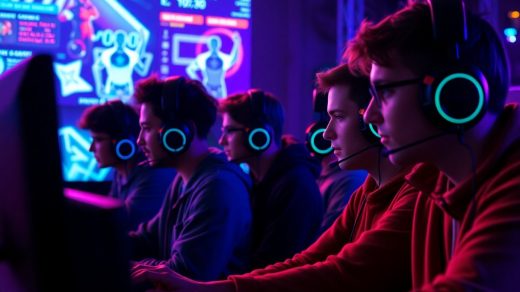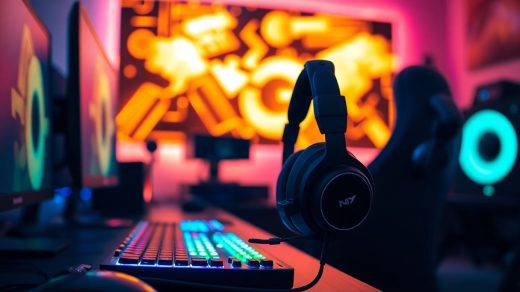As you examine into the world of gaming, you begin to notice how it influences your perception and interaction with others. Your gaming experiences shape your identity, fostering a sense of community and belonging. You start to identify with certain characters, genres, or gaming styles, which in turn reflect your personality and values. As you explore this virtual realm, you’ll discover how gaming culture plays a significant role in molding your online and offline persona, making it an integral part of your life.
Key Takeaways:
- Video game culture has a significant impact on shaping individual and collective identities, as gamers often form communities and develop a sense of belonging around shared gaming experiences and interests.
- Gaming can influence self-perception and identity formation, with players often experimenting with different roles, personas, and avatars, which can translate to real-life identity exploration and expression.
- The virtual worlds and narratives of video games can also reflect and shape societal attitudes, values, and norms, making gaming a powerful medium for social commentary, critique, and change, and highlighting the complex interplay between gaming culture and broader cultural contexts.
Gaming Identity Formation
To understand how gaming shapes your identity, it’s necessary to explore the concept of gaming identity formation. This process involves the creation and development of your digital self, which can significantly impact your sense of self and overall identity.
Digital Self-Expression
Towards the development of your gaming identity, you’ll find that digital self-expression plays a significant role. You can express yourself through various in-game actions, choices, and customizations, allowing you to showcase your personality and style.
Avatar Creation and Persona Development
Digitally, you can create and customize your avatar, which serves as a representation of yourself in the virtual world. This process enables you to experiment with different personas and identities, influencing your perception of yourself and your place within the gaming community.
And as you examine deeper into the world of gaming, you’ll discover that avatar creation and persona development can have a profound impact on your sense of identity. You can try out different roles, experiment with various traits, and develop a unique persona that reflects your values, interests, and preferences, ultimately shaping your gaming identity and influencing your interactions with others in the virtual world.
Social Connections in Gaming
There’s no denying that social connections play a significant role in shaping your identity as a gamer. You engage with others, form communities, and develop relationships that extend beyond the virtual world.
Online Communities
Alongside the rise of online gaming, an array of communities has emerged, allowing you to connect with like-minded individuals who share your passions and interests, fostering a sense of belonging and camaraderie.
Cross-Cultural Interactions
Alike the diversity of the gaming world, an exchange of ideas and cultural practices occurs, enabling you to learn from and engage with people from different backgrounds, broadening your perspective and understanding of the global gaming community.
But as you probe deeper into cross-cultural interactions, you’ll discover that they offer more than just a chance to make new friends or learn about different cultures. You’ll find that these interactions can also help you develop empathy, challenge your assumptions, and gain a deeper understanding of the complexities of the global gaming community, ultimately enriching your gaming experience and broadening your horizons.

Gaming Literacy
Keep in mind that gaming literacy is necessary for understanding the gaming culture. You need to be familiar with the terminology, genres, and mechanics to fully appreciate the experience. Your gaming literacy will help you navigate the complex world of gaming and connect with other gamers.
Digital Competency
Around the time you start gaming, you develop digital competency, which enables you to effectively use technology and understand digital media. You learn to operate gaming consoles, computers, and other devices, making you more comfortable in the digital world.
Problem-Solving Skills
Generally, gaming helps you develop problem-solving skills, as you encounter various challenges and obstacles in games. You learn to think critically and come up with creative solutions to overcome these hurdles, enhancing your analytical thinking.
Digital games offer a unique environment where you can practice and refine your problem-solving skills. As you progress through games, you encounter increasingly complex challenges that require you to think strategically and make informed decisions. Your ability to analyze situations, identify patterns, and adapt to new information improves, making you a more effective problem-solver in both gaming and real-life situations.
Gender and Representation
Many gamers are aware that the industry has made strides in representation, but there is still a long way to go. You can explore this topic further by checking out the Video Game Preference Study: How identity shapes play to see how your preferences might be influenced by your identity.
Character Diversity
Beyond the surface level, you’ll find that character diversity is an important aspect of modern gaming, allowing you to see yourself in the characters you play as and encounter.
Player Demographics
For instance, you might be interested to know that player demographics are shifting, with more women and non-binary individuals joining the gaming community, bringing their unique perspectives and preferences to the table.
Also, as you research deeper into the world of gaming, you’ll notice that your demographics can influence your gaming experience, from the types of games you play to the characters you identify with, and the online communities you join, allowing you to connect with like-minded individuals who share your passions and interests.
Gaming Subcultures
All gamers have their own unique communities, and you can find your place within these subcultures. You’ll discover that each group has its own distinct characteristics, shaped by the games they play and the values they share.
Esports Communities
Against the backdrop of competitive gaming, you’ll find esports communities that are passionate and dedicated. You can join teams, participate in tournaments, and engage with other players who share your interests and skills.
Streaming Culture
Only by immersing yourself in streaming culture can you truly experience the energy and excitement of live gaming. You’ll find that streamers create a sense of community, interacting with their audience and sharing their gameplay experiences.
To probe deeper into streaming culture, you’ll notice that it’s not just about watching others play, but also about participating in the conversation. You can engage with streamers, ask questions, and share your own thoughts and opinions, creating a sense of belonging and connection with others who share your passions.
Digital Citizenship
Not all gamers are aware of the impact their online actions have on their identity and community. As you navigate the digital world, you contribute to the gaming culture and shape your own identity.
Online Behavior
Betwixt the lines of online interactions, you’ll find that your behavior is a reflection of your personality and values. You’ll encounter various players, and your responses to them will define your digital footprint.
Virtual Ethics
Anytime you engage in online gaming, you’re faced with ethical decisions that influence your reputation and relationships with other players. You must consider the consequences of your actions and ensure they align with your personal values.
At the heart of virtual ethics lies the concept of accountability, where you take ownership of your actions and their impact on the gaming community. As you make decisions in the virtual world, you’ll develop a sense of responsibility and integrity that translates to your real-life interactions, shaping your identity and influencing your relationships with others.
Summing up
Conclusively, you see how video game culture influences your identity, as you engage with virtual worlds and characters. Your experiences shape your perceptions, and you can explore different identities. For more insight, visit Identities in Video Games from a Gender, Race, and Identity Perspective to understand the impact of gaming on your sense of self and social connections.
FAQ
Q: What role does video game culture play in shaping individual identity?
A: Video game culture plays a significant role in shaping individual identity as it provides a platform for self-expression, social interaction, and community building. Through gaming, individuals can explore different personas, experiment with various roles, and develop a sense of belonging to a particular group or community. The immersive nature of video games allows players to engage with virtual worlds, characters, and narratives, which can influence their perceptions, attitudes, and values, ultimately contributing to the formation of their identity.
Q: How do video games influence social relationships and interactions among gamers?
A: Video games have a profound impact on social relationships and interactions among gamers. Multiplayer games, in particular, facilitate communication, cooperation, and collaboration, fostering a sense of camaraderie and teamwork. Online gaming communities provide a space for players to connect with others who share similar interests, creating opportunities for socialization, friendship, and a sense of belonging. Additionally, video games can also provide a platform for social support, with players often forming close bonds and offering emotional support to one another.
Q: Can video games be a source of emotional expression and catharsis for players?
A: Yes, video games can be a powerful outlet for emotional expression and catharsis. Games often provide a safe space for players to explore and process their emotions, whether it’s through the narrative, gameplay mechanics, or artistic expression. Players can experience a range of emotions, from excitement and joy to sadness and frustration, in a controlled and manageable environment. This emotional release can be therapeutic, allowing players to confront and deal with their emotions in a healthy and constructive manner.
Q: How does video game culture intersect with other aspects of popular culture, such as music and film?
A: Video game culture intersects with other aspects of popular culture in numerous ways. Many video games incorporate elements of music, film, and literature, drawing inspiration from these mediums to create immersive and engaging experiences. Conversely, video games have also influenced music, film, and other forms of media, with many artists and creators drawing inspiration from gaming culture. The boundaries between these cultural forms are increasingly blurring, with video games, music, and film often converging to create new and innovative forms of entertainment and artistic expression.
Q: What are the potential implications of video game culture on mental health and well-being?
A: The implications of video game culture on mental health and well-being are complex and multifaceted. While video games can provide a range of benefits, such as stress relief, social connection, and cognitive development, excessive gaming can also have negative effects, including addiction, social isolation, and decreased physical activity. Furthermore, some games may contain mature themes, violence, or other content that can be potentially distressing or triggering for certain individuals. It is necessary to maintain a balanced and healthy approach to gaming, recognizing both the potential benefits and risks associated with video game culture.



